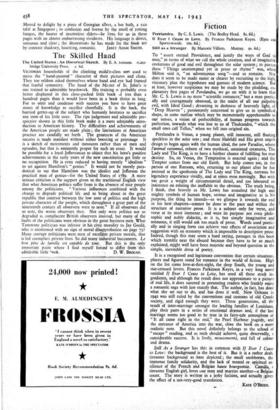The United States : An Historical Sketch. By E. A.
beruans. ‘Cam-
The Skilled Hand
bridge University Press. s 6d.
VICTORIAN households of the climbing middle-class sort used to stress the " hand-painted " character of their pictures and china. They too seldom asked themselves whose hand and eye had framed that fearful symmetry. The hand of the Master of St. John's is one trained to admirable brushwork. His training is probably even better displayed in this close-packed little book of less than a hundred pages than it would have been in a book thrice as long. For to omit and condense with success you have to have great stores of knowledge to sacrifice cheerfully. It is the hack, the hurried getter-up of the subject who humanly hesitates to sacrifice any item of his little store. The ripe judgement and admirable per- spective shown in this little book make it a most admirable intro- duction to American history. The difficulties and achievements of the American people are made plain • the limitations of American practice are candidly set forth The greatness of the American success is made manifest without either boosting or patronage It is a sketch of movements and measures rather than of men and episodes, but that is eminently proper for such an essay. It would be possible for a loyal. Jeffersonian to object that his hero's positive achievements in the early years of the new constitution get little or no recognition. He is even reduced to having merely " idealism " to set against Hamilton's " genius." It would not be merely para- doxical to say that Hamilton was the idealist and Jefferson the practical man of genius—for the United States of 1789. A more serious criticism is the support given to the traditional English view that what American politics suffer from is the absence of nice people among the politicians. " Various influences combined with the change to degrade political life and to bring about in the great republic that contrast between the low tone of politics and the high private character of the people, which throughout a great part of the nineteenth century all observers were to note." If all observers did so note, the worse observers they. Not only were politics not so degraded as complacent British observers insisted, but many of the faults of the politicians were obvious in the great business men. What Tammany politician was inferior in his civic morality to Jay Gould, who is mentioned with no sign of moral disapprobation on page 73? Many corrupt politicians were men of excellent private morals, that is led exemplary private lives. So did many industrial buccaneers. Le bon Ore de famine est capable de tout. But this is the only important point where I find myself forced to differ from this


























 Previous page
Previous page